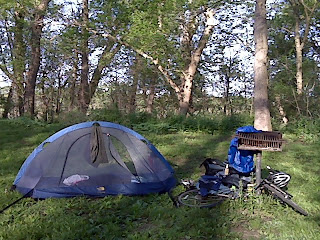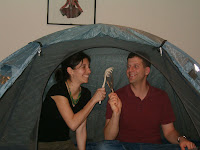These days everybody seems to be talking about buying -- even growing -- food locally and sustainably. For awhile I thought this might be just because of the people I tend to hang out with, but I'm not so sure any more. I got into a fairly detailed discussion at the bank the other day with one of the account managers who was telling me about the
vermiculture his family has been practicing for decades on their farm in Cali, his home town in Colombia. (Way more interesting than discussing my checking account, to be sure.) This chat simply would not have happened a year ago.
I was just this morning catching up on a backlog of articles and blog postings I have been meaning to read. (The fact that there is such a plethora of writing out there on sustainable food is exciting in itself.) There was a long piece in the
New York Times Business section that lauded the progress that the organic food movement has made in recent years, but implied an impending Congressional smackdown of the progressive food consciousness generated by the Obamas and Agricultural Secretary Tom Vilsack. (I'm intrigued that the 3-page article appeared in the Business section rather than, say, the weekend magazine. Telling, I think.) An
article reprinted on the Irresistible Fleet of Bicycles site (one of my favorites these days) posits that change is coming, but slowly. The key seems to be making this a more broadly supported social movement, rather than a foodie fad. And it needs politically savvy leaders. In a
critique of the NYT piece, Tom Laskawy, a Grist guest blogger, seemed to concur. He offered cautious hope. My [albeit ham handed] summary of his argument: Things are moving in the right direction. The great failing of the
NYT article was the way it seemed to minimize the growing collaboration between the sustainable ag, fair trade, international development, climate change, public health, nutrition, and food safety folks. People are beginning to buy into the idea that all of these things are related and that they need to be addressed. Food is the linchpin. We're moving toward a tipping point. Soon, policymakers will have to start listening in earnest.
Agribusiness is a tough nut to crack. What can we do? Grow things. Cook things. Support responsible producers of our food. Talk to people about it. (
Am I sounding like a broken record here?)
One of the more inventive variations on eating local, in my humble opinion, comes out of San Francisco: a
Community Supported Forage (CSF) box. It riffs off of the idea of the Community Supported Agriculture (CSA) arrangement -- a chunk of cash up front for a supply of whatever is locally harvested over a number of weeks. They're playing my song. Wild mushrooms? Really?? I've been too nervous to try mushroom foraging on my own, due to my fear of inadvertent self-poisoning. (I had some crazy Danish friends back when I lived in Mexico who used to go all the time. They admitted to having 2 designated mushroom taste testers -- human canaries, if you will -- with them on each fungus hunt. I wonder if I was being recruited as one of these.) Ah, but if someone who knew what they were doing would supply me with seasonal fiddleheads, morels, and wild blueberries -- or even let me tag along -- well, that sounds divine.
Finally, I've been in conversation in recent weeks with Zeke of
Washington's Green Grocer, who has always marketed an organic produce box, and now is offering artisanal breads and cheeses (yum!). With all of the interest in local produce these days -- if the tripling of crowds at the Dupont farmers market on Sundays is any indication -- I've been pestering him to offer a "local produce" box, a subset of the weekly organic box along the lines of the $29 "
dogma box" now available in the Boston area. (Ah, my people.) This may mean some weeks of stockpiled potatoes, apples, and rutabaga, but you can always do the "will call" rather than the "weekly" box. Or get creative with your recipes. Is the interest out there? I think it is.






















